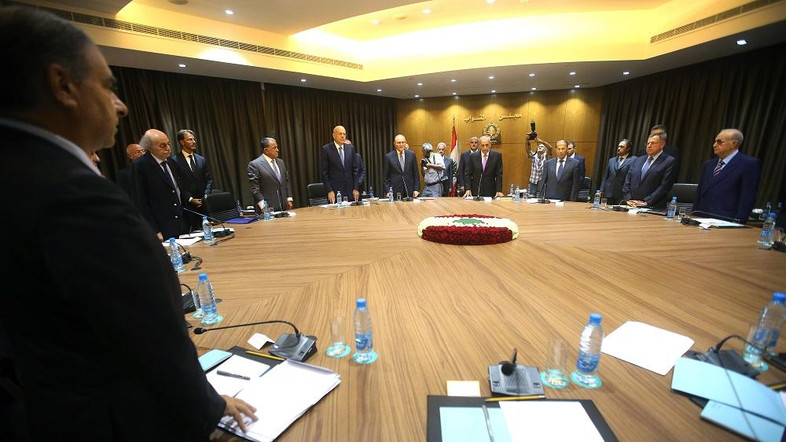
Gulfnews by Joseph A. KechichianSenior Writer
A last minute accord between the Lebanese Forces (LF) and the Free Patriotic Movement (FPM) ensured a quorum, although a key Christian party, the Phalange, withdrew from the chamber after their motion to first elect a head of state was rejected.
Parliamentarians approved 12 financial laws in record time, thereby fulfilling the chief international donors’ demands for Lebanon to comply with various requirements, before lawmakers turned their wrath against each other.
Discussions revolved around the ongoing trash crisis, and several engaged in shouting matches over the expenses to be allocated for the army’s ammunition purchases, secured within Saudi Arabia’s $4 billion (Dh14.69 billion) grants but still subjected to various local vagaries that interfered in technical military issues. At that point, Speaker Berri tasked several deputies to stipulate a draft law on the Saudi grant to be ready before the end of the session.
According to press reports, LF and FPM officials agreed to attend the legislative session after they secured two major concessions from the Speaker, who accepted to include the parliamentary electoral law as well as a draft-law on the re-naturalisation of immigrants of Lebanese origin, on his agenda. This was deemed a significant change but may have been done to ensure the vital financial draft-laws could be addressed.
All parties apparently agreed to form a joint committee that would be entrusted with the responsibility to prepare an electoral law before parliament. It was unclear whether the two months period allocated for this task was sufficient when deputies failed to reach a consensus on the same matter during the past 8 years.
In addition to the LF-FPM duopoly, Future Movement leader former Prime Minister Saad Hariri attended Thursday’s legislative session to vote on financial draft-laws as pledged, but said it would not participate in any follow-up sessions that did not tackle the proposed electoral draft-law first.
Prime Minister Tammam Salam joined the Speaker on Thursday morning and declared: “This is a national moment and we hail the efforts that led to holding the legislative session,” although little was said about its legality. It fell on Deputy Sami Gemayel, the Phalange Party leader, to remind the Lebanese that “Article 74 of the constitution stipulates that should there be a presidential vacuum for any reason, parliament must immediately convene to elect a new head of state.”
“By law,” Gemayel continued, “the parliament in the absence of a president transforms [itself] from a legislative body to an electoral one and must immediately elect a new president without any debate or discussions in accordance with the constitution.”
Gemayel hammered that there were “no technical, national, or constitutional factors hindering the election of a president,” and concluded by stating: “Is the implementation of the constitution prohibited and its violation permitted?”
Although Lebanon has been without a head of state since May 24, 2014 when the term of Michel Sulaiman ended without the election of a successor, Speaker Berri and Prime Minister Salam confronted critical dilemmas. Their chief concern was whether Beirut should forego sorely needed development funds from the World Bank and other donors because of its current political conundrum.
Ironically, the answer to this key question was delivered by the head of the pro-Syrian Marada Movement, and potential presidential candidate, deputy Suleiman Franjieh, who stressed on Wednesday that while the LF-FPM agreement achieved a partial “victory” for Christians — presumably because they managed to persuade the Speaker to include couple of draft-laws on parliament’s agenda — in reality such a settlement was a “Don Quixotic triumph” meaning that it was far less meaningful than many assumed.
Lebanon’s parliament convened on Thursday for its first legislative session in more than a year to pass financial laws the paralysed state urgently needs to stay afloat.Lawmakers are due to discuss development loans, debt issuance and banks at the two-day session, which began shortly after 0900 GMT. Thorny political issues have been left off the agenda, however.
Lebanon’s main political blocks had previously been unable to agree on an agenda for the session, obstructing efforts to convene the chamber. Some parties were still threatening a boycott until late on Wednesday.
The political deadlock means Lebanon risks missing out on World Bank loans that parliament needs to approve by year-end. The session is the first since parliament extended its own term in November last year.
The country’s politicians, bitterly divided by their own rivalries and wider conflict in the region, have failed to agree on even basic decisions, including where to dump rubbish.
The unity government headed by Prime Minister Tammam Salam is barely functioning. It includes Hezbollah, which is backed by Iran, and Saad al-Hariri’s Future Movement, backed by Tehran’s regional rival Saudi Arabia.
The deadlock has left Lebanon without a president for 17 months with parliament unable to agree on who should fill the post.
Parliament also needs to vote on banking legislation for trans-border cash movements, cooperation to fight tax evasion and amendments to the money laundering law.
A controversial electoral law has been left off the agenda.
Lebanon, one of the most indebted countries in the world, risks cancellation of badly needed World Bank loans and must vote on legislation to help protect its relationship with banks worldwide.
It is also struggling to cope with more than a million Syrian refugees who have fled the conflict at home.



